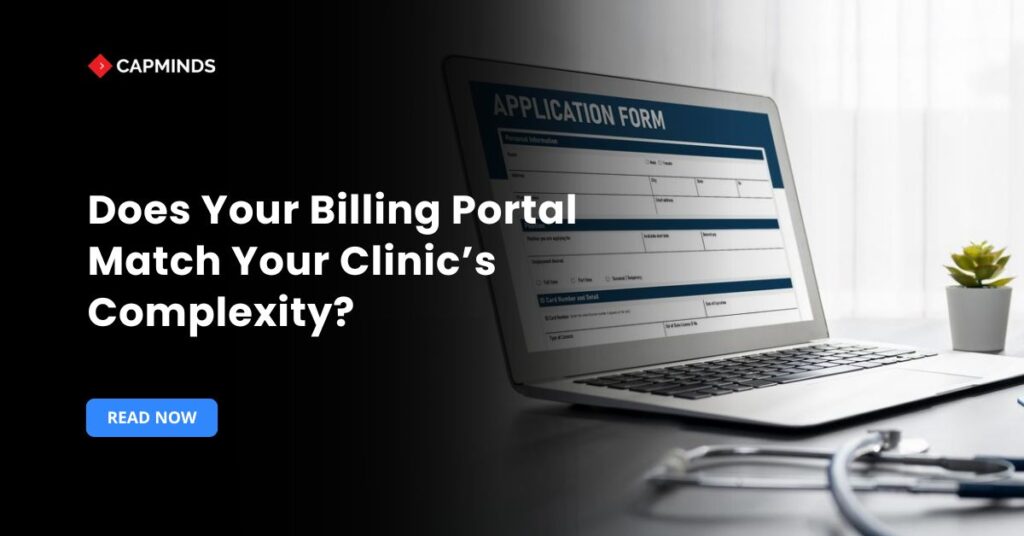Does Your Billing Portal Match Your Clinic’s Complexity?
Today’s healthcare landscape is diverse. Clinics vary greatly in size, specialties, and services. This means a billing portal for clinics isn’t a one-size-fits-all solution. It should reflect the specific needs and complexity of your practice. If your clinic offers multiple specialties or unique programs, consider this: Does your billing software support all your workflows, service types, and billing tiers?
An incompatible system can create inefficiencies, errors, and even result in lost revenue. In this post, we’ll dive into what clinic complexity means. We’ll also show you how to identify inefficiencies in your billing process and highlight the key features your clinic billing software needs to truly meet your requirements.
What Makes Your Clinic’s Billing Complex?
Every clinic has its blend of services and operational nuances that add complexity to billing. Clinic complexity in billing can stem from factors such as:
1. Multiple Specialties or Departments
Multi-specialty clinics manage a wide variety of CPT and diagnosis codes. Each specialty has its own set of billing codes. For example, orthopedic procedures require different codes than cardiology visits. Handling this broad range of codes accurately can be difficult. If your system isn’t designed for it, the risk of errors increases.
2. Diverse Payer Rules
Insurance plans, Medicare/Medicaid, and different payment models each come with their own set of rules. When your clinic deals with a complex payer mix, your billing portal must be flexible enough to accommodate various claim requirements and updates.
- For example, Federally Qualified Health Centers or community clinics often use sliding fee scales and grants.
- These additional layers complicate the billing process.
- If your software can’t handle these unique billing tiers, staff may end up using manual calculations, leading to inconsistencies.
3. High Patient Volume and Service Variety
As clinics expand or offer more services, the volume and variety of transactions increase. With greater complexity comes a higher risk of errors or delays, especially if the billing system isn’t equipped to handle it.
4. Regulatory and Compliance Demands
Each specialty and program comes with its own set of regulations. In a multi-specialty clinic, you might need to manage several federal or state billing guidelines at the same time.
For example, behavioral health services have specific privacy regulations and unique coding requirements. Labs, on the other hand, must comply with CLIA and other rules. Ensuring compliance across all areas can be challenging if your software doesn’t provide automated updates and checks to keep up with these evolving standards.
Signs Your Billing Portal Isn’t Keeping Up
How do you know if your billing portal for clinics isn’t a good match for your complexity? Look for these warning signs of inefficiency or mismatch:
1. Frequent Manual Workarounds
Are your staff using spreadsheets or manually calculating some bills because your system can’t handle them? Legacy billing systems often require staff to spend valuable time on paperwork and duplicate data entry.
This leads to delays, errors, and unnecessary frustration. If your team is repeatedly exporting data to Excel or re-entering information, that’s a clear sign of inefficiency in your system.
2. Coding Errors and Denials on the Rise
A telltale sign is an increase in claim errors or denials due to coding issues. When a portal isn’t designed for multi-specialty or complex billing, it may not support all the necessary codes or payer-specific edits.
In multi-specialty practices, the variety of codes and payer rules increases the chance of mistakes. Even small errors in a code or insurance detail can result in underpayments or claim denials. If you’re seeing high denial rates or lower-than-expected reimbursements, your software could be contributing to the issue.
Related: 10 Medical Billing Denial Codes That Affect Your Revenue
3. Inability to Consolidate or Customize Billing
If your clinic offers a variety of services, patients may end up with multiple bills for what they consider one episode of care. This can be especially frustrating at multi-specialty centers, where patients often expect to receive a single, consolidated bill. Meeting this expectation becomes difficult without a flexible billing system.
A rigid billing portal that can’t combine statements or apply specific billing rules for your clinic can create frustration for both patients and staff.
4. Disjointed Systems and Double Data Entry
Does your billing software integrate with your EHR, practice management, or scheduling systems? If not, staff probably retype information from one system to another, causing disjointed workflows and data entry errors. Lack of integration is a sign that the portal isn’t fully supporting your operations.
In a modern clinic, charges from the EHR should flow directly into billing, and insurance checks or payments should update automatically. If those don’t happen, your portal might be outdated.
5. Struggles with Special Programs or Payment Models
Clinics with special programs often find generic software lacking. For example, managing a sliding fee scale manually is prone to inconsistency and errors, and makes accurate revenue forecasting impossible. If your software can’t handle your specific billing tiers or care packages, it’s a mismatch.
6. Staff Overwhelmed by Billing Tasks
An overworked billing team can indicate that the system isn’t doing enough heavy lifting. Are your billing staff spending excessive hours on routine claims or follow-ups?
Inefficient billing processes increase administrative labor and pull staff away from higher-value work or patient care. In contrast, a well-matched system would automate many of these tasks, reducing the burden.
7. Patient Complaints About Billing
Finally, listen to patient feedback. If patients report confusion over bills, receive multiple statements for one visit, or find it hard to pay, it points to a subpar patient billing tool in your system. Traditional systems without a patient-friendly portal or payment plans tend to frustrate patients, leading to more calls and even unpaid bills. A modern billing portal should enhance the patient financial experience, not hurt it.
Identifying these signs is the first step. They highlight where your custom billing portals (or lack thereof) might be falling short of what your clinic’s complexity requires.
The Hidden Expenses of a Misaligned Medical Billing System
A billing portal that doesn’t align with your needs isn’t just an inconvenience; it can have serious repercussions for your clinic’s financial health and reputation. Some of the key risks and “hidden” costs include:
1. Revenue Loss from Denials and Underpayments
Inefficient or inaccurate billing leads directly to lost revenue. Claim denials due to coding errors or missing info mean you’re not getting paid for services provided.
- Underpayments can occur if your system doesn’t apply the correct contract rates or billing rules.
- These issues add up: revenue losses mount with each denied or underpaid claim.
- Over time, a mismatched billing portal could be leaving money on the table by not capturing charges or payer reimbursements correctly.
2. Higher Administrative Overhead
When software isn’t doing its job, humans have to pick up the slack. Staff spending extra hours on manual claim submission, corrections, and follow-ups translates into higher labor costs and less time for patient-focused activities.
Essentially, you’re paying employees to do what modern healthcare RCM platforms or billing software could automate. These hidden labor costs and productivity losses are significant for a busy clinic.
3. Compliance Risks
Healthcare billing comes with strict regulations, and non-compliance can result in audits, fines, or worse.
An ill-fitting system might not stay updated with the latest coding or regulatory changes, increasing the risk of billing errors that violate rules.
- For example, coding a service incorrectly or missing required documentation can be seen as fraudulent billing.
- Billing errors can trigger compliance issues and penalties if not caught.
- Without features like automatic updates for new codes or built-in compliance checks, your billing portal could put you at risk of regulatory issues.
4. Negative Patient Experience
Billing issues go beyond back-office tasks. They significantly affect patient satisfaction. When patients encounter unclear bills or receive multiple billing statements, they may start losing trust in your clinic. Inefficient billing systems create confusion and frustration. This impacts the entire patient experience.
A clear, consolidated, and timely billing process builds patient trust. If your system fails to provide a smooth billing experience, you risk not only losing patient loyalty but also damaging your clinic’s reputation.
5. Missed Opportunities for Growth
Time and resources spent on billing inefficiencies are resources that cannot be reinvested into growth. Clinics burdened by outdated billing systems often struggle to expand services, adopt new technologies, or focus on strategic improvements.
An inefficient billing portal can indirectly limit your clinic’s growth by tying up valuable resources. These resources could be better spent on innovation and enhancing patient care.
These hidden costs highlight why it’s essential to align your billing solution with the complexity of your clinic. This is not just an IT issue; it’s a strategic necessity for both your business and patient care objectives. The good news?
By recognizing these challenges, you’re already taking the first step toward finding solutions. The next move is to explore how a tailored billing system can effectively address these pain points.
Benefits of a Tailored Billing Solution
If your current system is falling short, a logical next step is to explore tailored billing solutions, whether that means configuring a more advanced platform or even considering a custom billing portal.
Adopting a solution aligned with your clinic’s needs can transform your revenue cycle and daily operations. Key benefits include:
- Workflow Fit and Customization
- Improved Accuracy and Fewer Errors
- Up-to-Date Compliance and Coding
- Efficiency and Automation
- Better Patient Financial Experience
- Scalability and Future-Proofing
By addressing the issues with a mismatched system, a tailored billing solution empowers your clinic to run at peak efficiency.
Fewer errors and denials mean higher revenue; automation and integration mean lower overhead; and patient-friendly features mean happier patients who are more likely to meet their financial obligations. It’s a win-win for the business and care sides of your practice.
Key Features to Look For in a Billing Portal for Complex Clinics
When evaluating healthcare RCM platforms or billing software to better match your clinic’s complexity, certain features and capabilities are especially important.
Use the following as a checklist of what robust custom billing portals or advanced systems should offer:
- Comprehensive Multi-Specialty Support
- Integrated Systems and Data Flow
- Automation and Claim Scrubbing
- Robust Denial Management and Analytics
- Patient-Centric Billing Tools
- Configurable Rules for Special Programs
- Security and Compliance Features
- Scalability and Support
By focusing on these features, you’ll be better equipped to select a billing portal for clinics that truly aligns with your practice. Remember, the goal is to eliminate the need for workarounds by having a system that naturally handles your complexity.
Streamline Your Clinic’s Billing with CapMinds Custom Solutions
At CapMinds, we understand that every clinic is unique, and so are its billing needs.
Our tailored billing portals are designed to support complex workflows, diverse service offerings, and multiple specialties seamlessly.
Whether you’re running a multi-specialty clinic, a behavioral health center, or a community health program, our solutions are built to align perfectly with your clinic’s complexity. Our services include:
- Custom Billing Portals for multi-specialty clinics and complex billing models
- Billing System Integration with EHR and practice management software
- Automated Claims Scrubbing to minimize errors and reduce denials
- Compliance and Security Features that keep you up to date with the latest regulations
- Patient-Centric Billing Tools for clear and consolidated statements
With CapMinds’ custom billing solutions, your clinic will experience fewer manual errors, streamlined workflows, and improved patient satisfaction.
Don’t let your billing system hold back your clinic’s growth. Contact us today to explore how we can tailor our services to meet your unique needs and drive better financial outcomes.




